GALLUP NEWS SERVICE
PRINCETON, NJ -- The massive publicity campaign associated with Bill Clinton's soon-to-be released memoir, My Life, has thrust the former president back into the news. Additionally, Clinton recently surfaced at what turned out to be a highly cordial White House ceremony as his official portrait was unveiled, and was clearly visible as ex-presidents attended the funeral of former President Ronald Reagan in Washington, D.C.
Clinton's presidency, which stretched from 1993 to 2001, was one of the more complex and tumultuous ones in recent times. Clinton began with significant problems, gained public trust as he sought re-election in 1996, and then entered the fascinating period during which he became only the second president in U.S. history to be impeached. Ironically, Clinton's job approval ratings rose, rather than fell, during the Monica Lewinsky scandal-impeachment period, and his second-term ratings were higher than those from his first term.
It's been only a little over three years since Clinton left office, so it's too early to get a firm grasp on what his lasting legacy will be from the perspective of the American people. What we do know is that he left office with a relatively high average job approval rating, and that his image, to this day remains polarized. Enough Americans still like Clinton, however, to ensure that he retains a place on Gallup Poll's annual list of most admired men, and that he is fourth on the list when Americans are asked to name the greatest president of all time.
Clinton's Ratings While He Was in Office
Clinton's average approval rating over the course of his administration, 55%, is just about average for presidents measured by Gallup since World War II. On the one hand, Clinton's ratings were higher than five former presidents -- Harry S. Truman, Richard Nixon, Gerald Ford, Jimmy Carter, and Reagan. On the other, Clinton's approval rating was lower than the average for Eisenhower, Kennedy, and George H.W. Bush. The average job approval ratings for Clinton and Lyndon B. Johnson were just about the same.
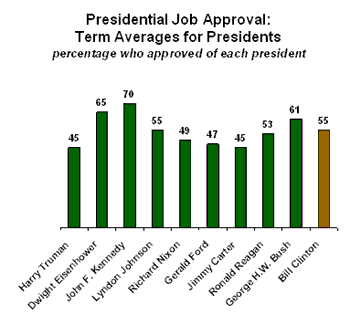
The trend line for Clinton's job approval ratings during his first term followed the pattern established by Reagan. Both men started out with relatively low ratings for their first three years in office, but saw their fortunes improve just in time to be re-elected -- Reagan in 1984 and Clinton in 1996.
In his first year in office, Clinton's job approval rating averaged 49%. His approval ratings then decreased to an average of 46% in his second year, and rebounded only slightly to 47% in his third year. (Clinton's lowest single approval rating of his entire administration, 37%, came in June 1993). Approval ratings for Clinton began to increase in 1996, to an average of 56% for that year, coincident with his successful re-election over Republican candidate Bob Dole. Clinton averaged 50% over his entire first term in office.
The pattern of job approval ratings for Reagan's and Clinton's second terms diverged significantly. Whereas Reagan's ratings dropped in the last two years of his term primarily as a result of the Iran-Contra affair, Clinton's rose in 1998 and 1999, just as he became only the second president in U.S. history to be impeached by the U.S. House of Representatives. Clinton's overall second-term average was substantially higher than his first term, at 61%. (Reagan's second-term average was 55%.)
Clinton's average job approval rating in 1997 was 58%. In 1998, in the midst of the Lewinsky scandal and the House vote on impeachment, Clinton averaged his highest yearly average approval rating, 64%. (In December 1998, Clinton received his highest single approval rating of 73%.) This created what is still a paradox to many observers -- the fact that revelations about Clinton's involvement with Lewinsky and his subsequent impeachment trial led to improved, rather than diminished, job performance ratings from the American people.
In his last two years in office, Clinton's approval stabilized, with roughly 6 in 10 Americans approving of the way he was handling his job as president.
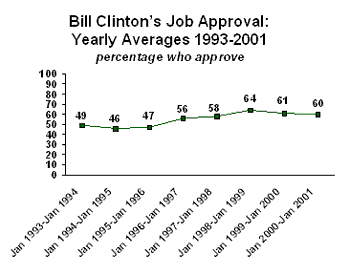
Clinton in Historical Perspective
Clinton scores relatively well in comparison with other recent presidents when Americans are asked how his presidency will go down in history. Still, Americans have rated Clinton's handling of the presidency slightly lower in recent years than right before he left office.
Clinton's average approval rating during his last year in office was 60%. In 2002, when Gallup asked Americans, in retrospect, whether they approved or disapproved of the way Clinton had handled his presidency, only a bare majority, 51%, said they approved.
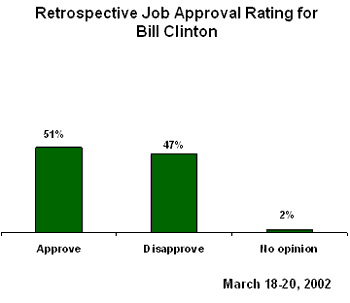
Clinton's retrospective job approval ratings in 2002 actually ranked toward the bottom of the list of the most recent presidents. Kennedy ranked the highest, with an 83% approval rating, followed by Reagan (73%), and George H.W. Bush (69%). Further behind were Ford and Carter, each with a 60% retrospective approval rating. Clinton only scored higher (51%) than Johnson (39%) and Nixon (34%).
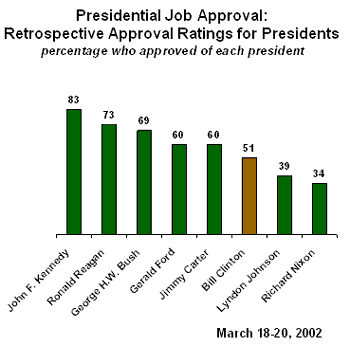
Interestingly, Clinton fares better when Americans are asked to assess how he and other recent presidents will go down in history.
The latest results from a Gallup Poll conducted in early June showed that 9% of Americans say Clinton will go down in history as an "outstanding" president, with an additional 29% saying "above average." During the Lewinsky scandal, Clinton generally scored somewhat lower on this measure, but since he left office, his ratings have remained at the current level.
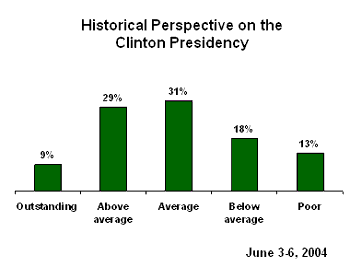
Although the current ratings are not spectacularly high, the percentage of Americans who say Clinton will go down in history as an outstanding or above-average president is actually higher than 6 out of 10 presidents included in the recent survey. Only three presidents rate better than Clinton -- Franklin D. Roosevelt, Kennedy, and Reagan. Behind Clinton ranks President George W. Bush, Carter, George H.W. Bush, Nixon, Johnson, and Ford.
|
Historical View of Presidents, June 2004 |
||||
|
|
|
|
|
Below average/poor |
|
|
% |
% |
% |
% |
|
Franklin D. Roosevelt |
24 |
53 |
17 |
2 |
|
John F. Kennedy |
23 |
55 |
19 |
2 |
|
Ronald Reagan |
15 |
43 |
31 |
10 |
|
Bill Clinton |
9 |
29 |
31 |
31 |
|
George W. Bush |
6 |
25 |
30 |
38 |
|
Jimmy Carter |
5 |
22 |
48 |
24 |
|
George H.W. Bush |
3 |
23 |
55 |
18 |
|
Richard Nixon |
3 |
11 |
34 |
51 |
|
Lyndon Johnson |
2 |
16 |
51 |
24 |
|
Gerald Ford |
2 |
12 |
66 |
17 |
At the same time, it's important to note that Clinton remains a polarizing president. While his positives are relatively high, his negatives are also high -- topped only by the percentage of Americans who say that Nixon and President George W. Bush will go down in history as below average or poor.
Clinton also does well when Americans are asked to name -- off the tops of their heads -- the "greatest United States president." Kennedy and Abraham Lincoln top the list, each mentioned by 17% of the public. Reagan is next on the list, at 13%, followed by FDR at 11%, Clinton, at 9%, and George Washington, at 7%.
|
Who do you regard as the greatest United States president? |
|||||
|
|
Nov 10-12, |
Apr 5-6, |
Feb 9-11, |
Feb 14-15, |
Feb |
|
|
% |
% |
% |
% |
% |
|
John Kennedy |
17 |
13 |
16 |
22 |
12 |
|
Abraham Lincoln |
17 |
15 |
14 |
18 |
18 |
|
Ronald Reagan |
13 |
10 |
18 |
11 |
12 |
|
Franklin Roosevelt |
11 |
9 |
6 |
12 |
9 |
|
Bill Clinton |
9 |
11 |
9 |
5 |
12 |
|
George Washington |
7 |
7 |
5 |
5 |
12 |
|
George W. Bush |
3 |
11 |
-- |
-- |
-- |
|
Harry Truman |
3 |
4 |
6 |
3 |
4 |
|
Thomas Jefferson |
3 |
2 |
1 |
3 |
2 |
|
Theodore Roosevelt |
3 |
2 |
2 |
3 |
3 |
|
Jimmy Carter |
3 |
3 |
4 |
3 |
3 |
|
Dwight Eisenhower |
2 |
1 |
1 |
3 |
2 |
|
George Bush (the elder) |
2 |
2 |
3 |
3 |
5 |
|
Richard Nixon |
1 |
1 |
1 |
2 |
2 |
|
|
|
|
|
|
|
|
Other |
2 |
2 |
5 |
3 |
1 |
|
None |
* |
1 |
2 |
* |
1 |
|
No opinion |
4 |
6 |
7 |
4 |
2 |
|
^ Asked of half sample. |
|||||
|
* Less than 0.5% |
|||||
Most Admired Man
Clinton has appeared on Gallup's top 10 most admired man list every year since he won the presidency in 1992. His appearances are less frequent than other presidents because he is a more recent president who was not well known prior to his presidency. Reagan was on the list for 31 years, in large part because of his longevity; he first appeared in the 1960s while governor of California.
|
Most Admired Man Summary |
|
|
Most Appearances in Top 10, 1948-2003 |
|
|
(Those still living appear boldface) |
|
|
|
% |
|
Billy Graham |
47 |
|
Ronald Reagan |
31 |
|
Pope John Paul II |
26 |
|
Jimmy Carter |
22 |
|
Dwight Eisenhower |
21 |
|
Richard Nixon |
21 |
|
Harry Truman |
20 |
|
Ted Kennedy |
18 |
|
Winston Churchill |
17 |
|
George H.W. Bush |
16 |
|
Douglas MacArthur |
15 |
|
Bill Clinton |
12 |
|
Henry Kissinger |
12 |
|
Nelson Mandela |
12 |
|
Colin Powell |
12 |
|
Pope Paul VI |
12 |
|
Adlai Stevenson |
11 |
|
Albert Schweitzer |
11 |
|
Jesse Jackson |
11 |
|
Herbert Hoover |
10 |
|
Pope Pius XII |
10 |